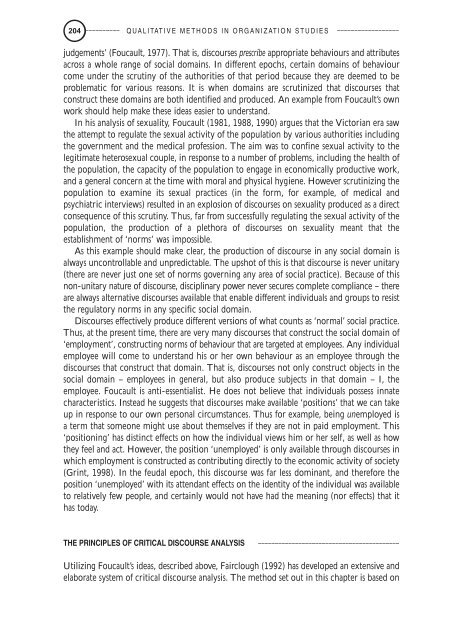essential-guide-to-qualitative-in-organizational-research
essential-guide-to-qualitative-in-organizational-research
essential-guide-to-qualitative-in-organizational-research
- No tags were found...
Create successful ePaper yourself
Turn your PDF publications into a flip-book with our unique Google optimized e-Paper software.
204 –––––––––– QUALITATIVE METHODS IN ORGANIZATION STUDIES ––––––––––––––––––judgements’ (Foucault, 1977). That is, discourses prescribe appropriate behaviours and attributesacross a whole range of social doma<strong>in</strong>s. In different epochs, certa<strong>in</strong> doma<strong>in</strong>s of behaviourcome under the scrut<strong>in</strong>y of the authorities of that period because they are deemed <strong>to</strong> beproblematic for various reasons. It is when doma<strong>in</strong>s are scrut<strong>in</strong>ized that discourses thatconstruct these doma<strong>in</strong>s are both identified and produced. An example from Foucault’s ownwork should help make these ideas easier <strong>to</strong> understand.In his analysis of sexuality, Foucault (1981, 1988, 1990) argues that the Vic<strong>to</strong>rian era sawthe attempt <strong>to</strong> regulate the sexual activity of the population by various authorities <strong>in</strong>clud<strong>in</strong>gthe government and the medical profession. The aim was <strong>to</strong> conf<strong>in</strong>e sexual activity <strong>to</strong> thelegitimate heterosexual couple, <strong>in</strong> response <strong>to</strong> a number of problems, <strong>in</strong>clud<strong>in</strong>g the health ofthe population, the capacity of the population <strong>to</strong> engage <strong>in</strong> economically productive work,and a general concern at the time with moral and physical hygiene. However scrut<strong>in</strong>iz<strong>in</strong>g thepopulation <strong>to</strong> exam<strong>in</strong>e its sexual practices (<strong>in</strong> the form, for example, of medical andpsychiatric <strong>in</strong>terviews) resulted <strong>in</strong> an explosion of discourses on sexuality produced as a directconsequence of this scrut<strong>in</strong>y. Thus, far from successfully regulat<strong>in</strong>g the sexual activity of thepopulation, the production of a plethora of discourses on sexuality meant that theestablishment of ‘norms’ was impossible.As this example should make clear, the production of discourse <strong>in</strong> any social doma<strong>in</strong> isalways uncontrollable and unpredictable. The upshot of this is that discourse is never unitary(there are never just one set of norms govern<strong>in</strong>g any area of social practice). Because of thisnon-unitary nature of discourse, discipl<strong>in</strong>ary power never secures complete compliance – thereare always alternative discourses available that enable different <strong>in</strong>dividuals and groups <strong>to</strong> resistthe regula<strong>to</strong>ry norms <strong>in</strong> any specific social doma<strong>in</strong>.Discourses effectively produce different versions of what counts as ‘normal’ social practice.Thus, at the present time, there are very many discourses that construct the social doma<strong>in</strong> of‘employment’, construct<strong>in</strong>g norms of behaviour that are targeted at employees. Any <strong>in</strong>dividualemployee will come <strong>to</strong> understand his or her own behaviour as an employee through thediscourses that construct that doma<strong>in</strong>. That is, discourses not only construct objects <strong>in</strong> thesocial doma<strong>in</strong> – employees <strong>in</strong> general, but also produce subjects <strong>in</strong> that doma<strong>in</strong> – I, theemployee. Foucault is anti-<strong>essential</strong>ist. He does not believe that <strong>in</strong>dividuals possess <strong>in</strong>natecharacteristics. Instead he suggests that discourses make available ‘positions’ that we can takeup <strong>in</strong> response <strong>to</strong> our own personal circumstances. Thus for example, be<strong>in</strong>g unemployed isa term that someone might use about themselves if they are not <strong>in</strong> paid employment. This‘position<strong>in</strong>g’ has dist<strong>in</strong>ct effects on how the <strong>in</strong>dividual views him or her self, as well as howthey feel and act. However, the position ‘unemployed’ is only available through discourses <strong>in</strong>which employment is constructed as contribut<strong>in</strong>g directly <strong>to</strong> the economic activity of society(Gr<strong>in</strong>t, 1998). In the feudal epoch, this discourse was far less dom<strong>in</strong>ant, and therefore theposition ‘unemployed’ with its attendant effects on the identity of the <strong>in</strong>dividual was available<strong>to</strong> relatively few people, and certa<strong>in</strong>ly would not have had the mean<strong>in</strong>g (nor effects) that ithas <strong>to</strong>day.THE PRINCIPLES OF CRITICAL DISCOURSE ANALYSIS ––––––––––––––––––––––––––––––––––––––––––Utiliz<strong>in</strong>g Foucault’s ideas, described above, Fairclough (1992) has developed an extensive andelaborate system of critical discourse analysis. The method set out <strong>in</strong> this chapter is based on



